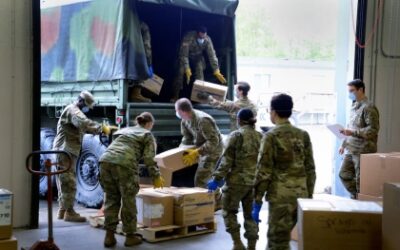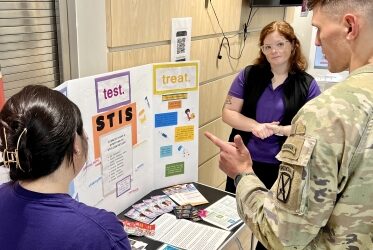The mortality burden associated with bacterial bloodstream infections is substantial in the MHS, with about 1 in 4 patients dying within 1 year of a bacterial bloodstream infection diagnosis, according to a recent study.
2023-to-2024 XBB.1.5 COVID-19 Vaccines Weren’t Effective Over Long Term
Serious concerns were raised in a new VA study about the effectiveness of COVID-19 vaccines targeting the XBB.1.5 Omicron variant, which were introduced in September 2023.
High Plantar Fasciopathy Rates in U.S. Military
U. S. armed forces have high rates of ankle and foot injuries and mean medical and personnel costs for the DoD.
Concerns Raised About Severe Allergic Reactions in Outdoor Military Personnel
Tick bites in U.S. military personnel are leading to the development of antibodies to alpha-gal, a molecule found in most mammals, and possibly alpha-gal syndrome, a serious, potentially life-threatening allergic reaction.
Melatonin Appears to Have Some Effect Enhancing Flu Vaccine
Noting that vaccine immunogenicity is affected by a variety of factors, melatonin has been reported to affect immune responses to vaccines and infection, according to a new study.
Older White Veterans Most Likely to Get Flu Vaccines
How do race, ethnicity, sex and rurality affect influenza vaccination adherence in a VHA cohort?
House Coronavirus Committee Held Its Last Meeting in November
Next month marks the 5-year anniversary of the first case of COVID-19 reported in the United States. Since then, more than 110 million Americans have been infected, and 1.2 million have died.
Federal Medicine’s Role in Uncovering How the Epstein-Barr Virus Relates to MS
We interviewed Lynn Levin, MD, formerly of the Department of Epidemiology, Division of Preventive Medicine, Walter Reed Army Institute of Research, about the research that led to the discovery of the crucial role of the Epstein-Barr virus in the development of multiple sclerosis and several other autoimmune disorders.
DHA Releases Flyer to Educate Servicemembers About Mpox Risk, Protection
In response to the August 2024 upsurge of mpox in the Democratic Republic of Congo and other Africa countries, the Defense Health Agency (DHA) has produced a new flyer: Mpox—What Servicemembers SHOULD KNOW.
More Point-of-Care Testing in Military Could Help Curb STI Transmissions
Sexually transmitted infections (STIs) affect an estimated 1 in 5 servicemembers, making early diagnosis and treatment important for controlling their spread among this high-risk population.
New Study Warns About Increased Antibiotic Resistance Against Third-Generation Broad-Spectrum Antibiotics in VA Facilities
VHA facilities across the United States have experienced a concerning rise in antibiotic resistance to third-generation cephalosporins, a class of broad-spectrum antibiotics commonly used to treat the Enterobacterales bacterial species.
Unraveling the Mystery of Long COVID: VA Steps Up for Nation in Crisis
By March 2020, the SARS-COV-2 virus had reached every inhabited continent on the globe, with devastating impact. In response, the U.S. and many other countries entered lockdowns to slow the spread and reduce deaths from the virus.
RSV Is as Severe as COVID-19, Flu When Everyone’s Unvaccinated
A recent study suggested that RSV disease severity is similar to unvaccinated patients hospitalized with COVID-19 or influenza, but significantly more severe than patients hospitalized with those diseases who had been vaccinated.
Mounting Evidence of RSV Severity Bolsters Argument for Vaccination
Immunization levels against respiratory syncytial virus (RSV) among older adults remained relatively low at around 24% as of late March. As a comparison, national coverage with influenza vaccines for all U.S. adults was 48.3% in the same time period, 2% higher than last year.
Mortality Up in VHA Inpatients With COVID-19 Plus Hospital-Acquired Infections
Pseudomonas aeruginosa (PA), an opportunistic pathogen commonly associated with healthcare-associated infections, has a high mortality rate. The organism’s high virulence and ability to rapidly acquire resistance to antibiotics make PA infections a treatment challenge.
Nearly 20% of Veterans Showed Decline During COVID-19 Pandemic
While most U.S. veterans maintained or improved physical and mental function a year into the COVID-19 pandemic, almost 20% showed a decline, according to a new study.
HIV Preexposure Prophylaxis in MHS Not Linked to Higher STI Risk
Consistent use of HIV preexposure prophylaxis (PrEP) has been shown to reduce the risk of sexual risk of HIV acquisition by 99% among men who have sex with men (MSM).
VA Study: Microbial Contamination Continues in Hospitals, Even When Recommended Cleaning Protocols Are Followed
Microbial contamination—including pathogenic and potentially pathogenic bacteria—persisted on high-touch hospital surfaces despite compliance with recommended disinfection protocols, according to a study performed at the Central Texas Veterans Healthcare System.
COVID-19 Mortality Looks Somewhat Different Based on New VA Study
A study team involving VA researchers looked at death rates during the COVID-19 pandemic through a different lens and came up with intriguing information from individual-level instead of aggregate data.
Military/VA Study Finds That Smallpox Vaccination Is Effective Against MPox
The smallpox vaccine appeared to be effective in preventing mpox (formerly called monkeypox) in U.S. military personnel and veterans, even if received more than a decade previously, according to a new report.
Too Few VA Anal Cancer Exams in HIV Patients
Because human immunodeficiency virus (HIV) patients are at high risk for anal cancer, screenings are recommended annually for U.S. veterans with HIV.
Flexible Prevention Bundle Appears to Reduce Some Surgical Site Infections
Surgical site infections (SSIs) are associated with significant morbidity and mortality, prolonged length of hospital stay and readmission.
Lower Risks of Adverse Effects in Older Adults With Moderna COVID-19 Vaccine
Receipt of the Moderna COVID-19 vaccine by older adults was associated with a lower risk of adverse events than the Pfizer-BioNTech version, according to a new study.
Antibiotic Prescribing High for Respiratory Infection Patients; HIV Not a Factor
Inappropriate antibiotic prescribing for acute respiratory infections, a major public health concern, is high in both patients with and without human immunodeficiency virus (HIV) and doesn’t appear to be affected by HIV status, according to a recent study.
VA Doctor-Turned-Inventor Works to Prevent Infectious Disease Spread
Part of the inspiration for Chetan Jinadatha, MD, MPH, to specialize in treating infectious disease comes from going to medical school in his native India, which has a high burden of such diseases. However, he also likes to say it’s partly for selfish reasons.
VA Researchers Find Biomarkers for Potentially Serious Parasitic Infections
Asymptomatic Leishmaniasis Infected Nearly 20% of Soldiers in Iraq BETHESDA, MD—New research has identified three chemokines as potential biomarkers for asymptomatic visceral leishmaniasis (VL), a chronic infection caused by Leishmania (L.) donovani or L. infantum....
Do Fungal Pathogens Cause ARI More Often Than Previously Suspected?
Fungal infections are known to be causes of community-acquired pneumonia (CAP) and acute respiratory illness (ARI), but it is not clear how their frequency compares with that of viral and bacterial causes of these conditions.
Paxlovid Reduces Likelihood of Long COVID in Patients at Severe Infection Risk
A recent study suggested, that Paxlovid, which is prescribed to patients infected with SARS-CoV-2, who are at risk for severe symptoms, also might help protect against the condition. Researchers found the antiviral also lowered the likelihood of post-acute death and hospitalization.
VA Spent Millions on HPV-Related Cancer But No Vaccination Promotion
Vaccinations for Veterans, Servicemembers Half of Civilian Rate ST. LOUIS—Eligible active-duty servicemembers and veterans have dramatically lower rates of human papillomavirus (HPV) vaccination, placing them at much greater risk of related cancers, according to a new...
HIV Patients Have Worse Long-Term Survival Following Coronary Procedure
The burden of cardiovascular disease among HIV patients has tripled over the past few decades, and cardiovascular mortality has steadily risen.






